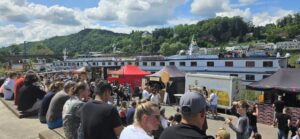On the edge of an erected concrete to prevent the Moselle, a popular river housing two local cruise ships with the Dutch and German flags tucked at both the back and front, from overflowing it’s banks, a black speaker stashed between two food carts, birthed Bob Marley’s ‘Buffalo Soldier’, to the hearing of a mixed crowd of European, Africans, Asians and more.
A young couple and their children sat on the concrete stairwell, tacking into a carefully sliced yam on a stick. Or khebab, as we Ghanaians say. Midway through the song, the man grabbed the last end of his hamburger and pushed it down his throat. He raised the plastic cup containing a drink to wash it down. His wife, whose eyes were hidden behind thick Ray-Ban glasses, took her time to go through her meal.

Before the song could fade for another of Bob Marley’s song to takeover, a chef inside an African and Caribbean food branded cart wearing thick locks and black t-shirt happily dished out sliced plantain and red sauce to a happy customer. His legion of customers patiently took their time to be served, as those who got their meal walked with happy faces.
The occasion was a Street Food Festival in Trier, Germany. Founded by the Romans in the first century, Trier is regarded as the oldest city in the country. It is also the birthplace of Karl Marx, the historian, philosopher, essayist and econmoist who is credited for developing the theory of socialism.
To celebrate his 200th birthday, the Chinese Government donated a statue of him which sits in the heart of the city, near Porta Nigra, a Roman city gate said to be more than three hundred years old. Porta Nigra welcomes tourists from around the world who are often amazed by the sheer size of the monument. It is towering. This year, it might be a scene of an open air concert and the rest of the world might be there.
Porta Nigra is a UNESCO World Heritage site. But the food festival around the Moselle sets the stage for the planned activities in the coming months. Patrons had a unique experience of savouring global cuisines and drinks that left some of them salivating for more.
From Africa, Caribbean, Latin America and Germany itself, the flavours were in abundance. Street food festivals have become integral part of global food culture. It is also an identity that opens the door for people to be understood within the context of their values. And the festival somewhat had a bit of that on display. Even some of the patrons who showed up wore outfits depicting their country of origin.
Food culture is an important aspect of the immigrants story. Immigrants communities who leave their countries of birth do carry with them the food culture. If you go to a typical Ghanaian community for exmaple, Kenkey, Banku, Fufui, Akple, Tuo Zaafi and more are likely to be on display on the menu for lunch or dinner. And the recipes associated with these dishes are passed on across generations. .
From Trier to Berlin, food festivals have become part of the cities activities, and receive support from the various councils. In 2003, UNESCO established the Intangible Cultural Heritage of Humanity to protect and preserve a range of social practices, from craftsmanship to festive events and, of course, food traditions.

The Italian Neapolitan pizza and the baguette of France are listed as having attained a UNESCO culinary status. It is not by coincidence that across the world, wherever pizza is sighted, the first country that comes to mind is Italy. During my student days in New York, anytime I felt homesick and needed waakye, banku or fufui or any Ghanaian meal, the popular Accra Restaurant in the Bronx was my plug.
The ambience gave something close to the look and feel of a Ghanaian chop bar, even if it’s lacking in certain areas. These restaurants can be found in other parts of the world, where Ghanaian immigrants continue to preserve the heritage through ancient recipes.
In the upcoming summer, several cities are expected to host food shows from the immigrants communities. In Berlin for example, African Food Festival may be taking place. The event offers an open display of cuisines from across the African continent, and revellers can either stick to what they are used to, or try something new. And the show comes with DJs on rotation, who play from Afrobeat to any other genre that keeps the vibe going.
Alongside the food, Trier – home of fine wines – will tap into its rich wine culture along the Moselle. They have been making wine along the Moselle since Roman times. It boasts a favourable climate with slate and sandstone soils that produce excellent terroir, especially for Riesling.










